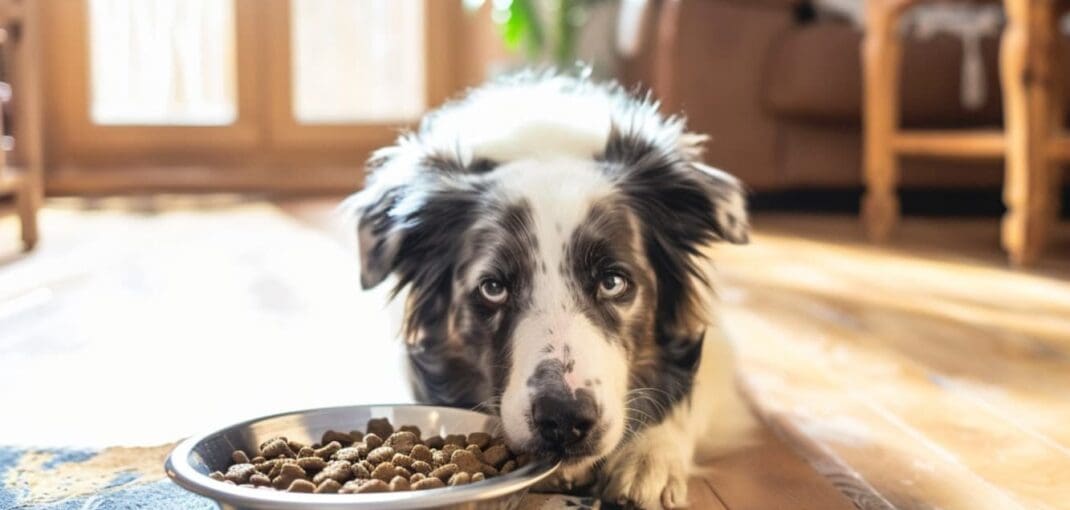Every pet guardian has certainly encountered a situation at least once where their pet has suddenly become uninterested in its food. Why doesn’t the dog want to eat the food? There can be many reasons, from trivial ones such as boredom with the taste to serious health problems. Here are some reasons that may explain why your dog has stopped eating and what you can do in this situation.
Why doesn’t your dog want to eat food? What could be the reason for the lack of appetite?
Has your beloved pet suddenly stopped being interested in food? This can raise many concerns. If this is the case, don’t play down the problem and find out why your dog doesn’t eat food and what the most common reasons are.
A dog’s lack of appetite can be due to a variety of reasons. One of the most common reasons is health problems such as oral diseases (e.g. sore gums or teeth), gastrointestinal disorders or infections. In such cases, the pet may not want to eat to avoid pain when biting or swallowing. Other reasons may be changes in the dog’s environment, such as moving house or stressful events, which can also affect the dog’s appetite.
Cause Symptoms Possible solutions
Health problems Pain in the mouth, stomach problems Consult a vet, treat underlying diseases
Boredom with the taste of food Dog ignores food, lack of interest Change in food, introduction of variety into the diet
Change in environment/stress Apathy, nervousness Stabilise routine, eliminate stressors
Overfeeding with snacks Lack of hunger Limit treats, fixed meal times
Many people wonder why their dog does not want to eat dry food. This may be due to the monotony of meals – animals, like humans, can get bored with the same food. If a dog eats the same food for a long time, it can lose interest. On top of this, sometimes a change in food composition or formula can affect its taste and texture, This will make dry dog food unattractive and your pet will be reluctant to reach for the food.
Why did your dog stop eating dry food? Possible explanations
Is your dog not eating dry food? This is a common problem, especially with older dogs. It may be due to difficulty chewing hard pellets due to dental problems. Pain in the mouth can discourage your dog from eating, so it is worth paying attention to the health of the teeth and gums.
Another reason why your dog has stopped eating may be the reduced palatability of dry food. Dogs prefer wetter, more flavoursome food, so wet dog food is often more appealing. A pet may also stop eating dry food if it gets too many snacks between meals, leaving it hungry.
Why doesn’t your dog want to eat wet food? Differences in preferences
Although wet dog food is usually more palatable, some pets may lose interest in it. This is often due to the texture of the food, which some pets find less appealing than hard, crunchy food. Sometimes pets prefer dry dog food because of the texture, which resembles the natural chewing behaviour.
It is also worth making sure the wet food is fresh and stored properly. Spoilt or improperly stored food can discourage your dog from eating it.
What steps to take when your dog won’t eat dry food?
If your dog has stopped eating dry food, it is worth trying some home solutions. For example, you could add a small amount of broth to the food to make it more palatable. Introducing variety into the diet by mixing wet and dry food can also help.
Additionally, it is important to avoid overfeeding your dog with treats between meals, as these can disrupt regular food eating. If the eating problem persists for a long time, it is worth consulting your vet to rule out health problems.
When does lack of appetite require a visit to the vet?
A dog’s appetite problem can be a symptom of more serious health problems, such as gastrointestinal disease, infection or hormonal problems. If a dog does not eat for more than 24 hours or shows other symptoms such as apathy, vomiting or diarrhoea, a visit to the vet is necessary.
Could a change of food be the reason why my dog is not eating?
Changing food can affect your dog’s appetite, especially if the new food differs in composition, taste or texture from the previous one. Why doesn’t the dog want to eat its food after a change? Pets are attached to their habits and a sudden change in diet can make them reluctant to eat.
To avoid problems, it is advisable to introduce the new food gradually, mixing it with the existing food in increasing proportions. This will allow the dog to get used to the new taste and texture.
A dog’s appetite problem can be caused by a number of factors, from health problems to stress or boredom. It is worth observing your pet and reacting to any changes in their behaviour. If your dog has stopped eating, it is important to find the cause and take appropriate steps to restore his desire to eat. If in doubt, it is always worth consulting your vet.






